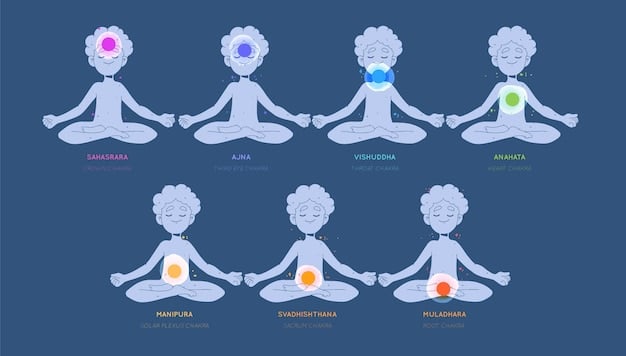Lower Blood Pressure Naturally: The Power of 15-Minute Meditation

According to a recent study, just 15 minutes of daily meditation can significantly lower blood pressure in three months, offering a natural and accessible approach to cardiovascular health.
Could a calmer mind lead to a healthier heart? A new study suggests that just 15 minutes of daily meditation could be a powerful tool in lowering blood pressure within three months. Let’s dive into the findings and explore how this simple practice can benefit your overall well-being.
The Surprising Link Between Meditation and Blood Pressure
For years, doctors have emphasized the importance of diet and exercise in maintaining healthy blood pressure. Now, emerging research highlights the role of mental well-being, specifically the potential for meditation to positively impact cardiovascular health.
The study, which focused on the effects of short, daily meditation sessions, presents compelling evidence that even brief periods of mindfulness can lead to measurable reductions in blood pressure. This opens exciting new avenues for those seeking alternative or complementary approaches to managing hypertension.
Understanding the Research
The study involved a group of participants with mildly elevated blood pressure who were instructed to meditate for 15 minutes each day. Researchers tracked their blood pressure readings over a three-month period, comparing them to a control group who did not meditate. The results revealed a significant decrease in blood pressure among the meditation group.
- Participants in the meditation group experienced an average decrease in both systolic and diastolic blood pressure.
- The reduction in blood pressure was comparable to that achieved by some medications.
- Participants also reported lower levels of stress and anxiety.
These findings suggest that meditation can be a valuable tool in the fight against hypertension, offering a drug-free approach to managing blood pressure and improving overall well-being. The accessibility of meditation makes it an appealing option for many.
How Does Meditation Lower Blood Pressure?
While the precise mechanisms are still being explored, scientists believe that meditation triggers a cascade of physiological changes that contribute to lower blood pressure. These changes involve the nervous system, hormone regulation, and even the immune system.
By promoting relaxation and reducing stress, meditation can help to counteract the effects of chronic stress, which is a major contributor to hypertension. The practice encourages a shift from the “fight or flight” response to a more balanced state of calm and equilibrium.

The Role of the Nervous System
Meditation stimulates the parasympathetic nervous system, often referred to as the “rest and digest” system. This activation leads to a decrease in heart rate, slower breathing, and relaxation of blood vessels. All of these factors contribute to lower blood pressure.
Conversely, meditation helps to dampen the activity of the sympathetic nervous system, which is responsible for the “fight or flight” response. By reducing the release of stress hormones like adrenaline and cortisol, meditation can prevent the surge in blood pressure that often accompanies stressful situations.
- Meditation promotes relaxation and reduces activity in the sympathetic nervous system.
- It stimulates the parasympathetic nervous system, leading to a slower heart rate and relaxed blood vessels.
- Regular meditation can help to regulate the body’s response to stress, preventing spikes in blood pressure.
Collectively, these neurological changes create an environment that supports healthy blood pressure levels and reduces the risk of cardiovascular complications.
Getting Started with 15-Minute Daily Meditation
The beauty of this study is that it demonstrates the benefits of even short meditation sessions. You don’t need to be a seasoned meditator to reap the rewards; just 15 minutes a day can make a significant difference.
To get started, find a quiet space where you can sit comfortably without distractions. Close your eyes and focus on your breath, noticing the sensation of each inhale and exhale. If your mind wanders, gently redirect your attention back to your breath.
Simple Meditation Techniques
There are many different meditation techniques you can try, but here are a few simple ones to get you started:
Mindfulness Meditation: Focus on the present moment without judgment. Observe your thoughts, feelings, and sensations without getting carried away by them.
Guided Meditation: Listen to a guided meditation recording that leads you through a visualization or relaxation exercise.

- Begin with guided meditations to ease into the practice.
- Use apps or online resources for structured sessions.
- Consistency is key; aim for daily sessions, even if they are short.
Experiment with different techniques to find what works best for you. There are countless resources available online and in your local community to support your meditation journey.
Other Lifestyle Changes to Support Healthy Blood Pressure
While meditation can be a powerful tool in lowering blood pressure, it’s important to remember that it’s just one piece of the puzzle. A healthy lifestyle that includes a balanced diet, regular exercise, and stress management is essential for optimal cardiovascular health.
Incorporate blood pressure-friendly foods: increase your intake of fruits, vegetables, whole grains, fish, and potassium-rich foods and limit sodium and sugar intake.
Diet and Exercise for Healthy Blood Pressure
Making simple changes to your diet and exercise routine can have a significant impact on your blood pressure. Here are a few tips to get you started:
Consume a balanced diet rich in fruits, vegetables, and whole grains. The DASH (Dietary Approaches to Stop Hypertension) diet is specifically designed to lower blood pressure.
Engage in regular physical activity, such as brisk walking, jogging, swimming, or cycling. Aim for at least 30 minutes of moderate-intensity exercise most days of the week.
- Reduce sodium intake: Processed foods are often high in sodium, which can raise blood pressure.
- Avoid excessive alcohol consumption: Limit alcohol intake to no more than one drink per day for women and two drinks per day for men.
- Manage stress levels: Chronic stress can contribute to hypertension. Find healthy ways to manage stress, such as yoga, tai chi, or spending time in nature.
The combination and culmination of healthy habits supports healthy blood pressure levels, reduces the risk of cardiovascular complications, and improves overall quality of life.
The Long-Term Benefits of Meditation and Low Blood Pressure
Beyond lowering blood pressure, regular meditation offers a myriad of other health benefits. From reducing stress and anxiety to improving sleep and boosting immunity, meditation can positively impact virtually every aspect of your well-being.
When consistently practiced, meditation helps fosters deeper self-awareness and encourages relaxation and a more positive outlook on life.
Holistic Well-Being
Meditation has a compounding effect, that influences mental, emotional, and physical health:
Reduced stress and anxiety: Meditation can help to calm the mind and reduce feelings of stress and anxiety.
Improved sleep quality: Regular meditation can promote relaxation and improve sleep quality.
- Boosting immunity: Some studies have shown that meditation can enhance immune function.
- Increased focus and concentration: Meditation can help to improve focus and concentration.
- Improved mood and emotional regulation: Meditation can promote feelings of well-being and improve emotional regulation.
Adding stress management techniques to your daily habits can promote holistic well-being and is highly beneficial for a healthier, happier life.
Expert Opinions and Insights on Meditation for Blood Pressure
Numerous experts in the field of medicine and wellness support the use of meditation as a complementary therapy for managing blood pressure. They highlight the safety and accessibility of meditation, as well as its potential to empower individuals to take control of their health.
Many doctors recommend meditation as a proactive approach to cardiovascular health, particularly for individuals with mildly elevated blood pressure or those seeking alternative therapies.
Dr. Herbert Benson, a pioneer in mind-body medicine, has extensively researched the effects of meditation on blood pressure. His studies have shown that meditation can elicit the “relaxation response,” which counteracts the harmful effects of stress on the cardiovascular system.
- Consult with your doctor: Before starting any new health regimen, it’s important to consult with your doctor to ensure that it’s safe and appropriate for you.
- Listen to your body: Pay attention to how your body responds to meditation and adjust your practice accordingly.
- Be patient: It may take time to see noticeable results. Be patient with yourself and keep practicing regularly.
Expert-backed insights, when combined with self reflection, can improve overall well-being and support long term heart health.
| Key Point | Brief Description |
|---|---|
| 🧘 Daily Meditation | 15 minutes can lower blood pressure. |
| 🧠 Nervous System | Activates “rest & digest”, lowers heart rate. |
| 🍎 Lifestyle Changes | Healthy diet & exercise enhance benefits. |
| 🩺 Expert Support | Recommended as a complementary therapy. |
Frequently Asked Questions
▼
The study showed noticeable reductions within three months of daily practice. Consistency is key for sustained results.
▼
Mindfulness and guided meditations are commonly recommended. Experiment to find a method that suits you.
▼
Meditation can complement medication but should not replace it without consulting your healthcare provider.
▼
Meditation is generally safe. However, individuals with mental health conditions should consult a professional first.
▼
It’s normal for thoughts to arise. Gently redirect your attention back to your breath each time your mind wanders.
Conclusion
The groundbreaking new study provides the insight that daily meditation sessions can result in lower blood pressure levels. Start by incorporating regular mindful practices, dietary choices, and regular exercise to give yourself an overall healthy approach towards your well-being.





